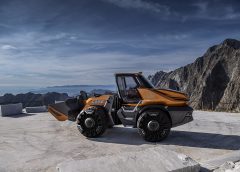CASE Construction Equipment featured the methane-powered ProjectTETRA wheel loader at ConExpo-Con/Agg 2020, highlighting the manufacturer’s commitment to sustainability through alternative propulsion solutions.
The new wheel loader concept demonstrates the viability of alternative fuels in construction equipment and the feasibility of using fuel generated from waste products and renewable sources to perform loading/earthmoving operations. The machine is powered by a proven methane engine, produced by CASE sister-brand FPT Industrial, that delivers comparable performance as its diesel equivalent. ProjectTETRA has been tested in real-world construction environments and has the potential to lower total lifetime operating costs while simultaneously meeting sustainability objectives for its owners.
ProjectTETRA leverages more than seven years of experience and testing of methane engines with fellow CNH Industrial manufacturer New Holland agriculture, as well as more than 40,000 natural gas engines produced by FPT. The FPT engine featured in ProjectTETRA operates at 230 hp.
Its performance would be similar to the 821G in the current CASE wheel loader lineup – a popular size class across a broad cross-section of construction industry segments. When running on methane, CO2 emissions are reduced by a minimum of 10% in real working conditions and become virtually zero when using biomethane. Polluting emissions are reduced by an average of 80% compared to a standard diesel engine, and operating noise is reduced by as much as 50%.
The loader would run for an entire standard workday on a single tank of fuel – and fill-up is as quick and easy as diesel. A simple, maintenance-free aftertreatment system featuring a single catalytic converter is used to meet emissions standards as the combustion of methane produces significantly lower emissions.
“This is the blueprint for working smarter and cleaner without sacrificing performance,” said Brad Stemper, North American product line leader for excavators and wheel loaders, CASE. “Operations capable of producing biomethane could see their fuel costs drop to zero, and others will be able to run off the existing compressed natural gas (CNG) supply network and still achieve considerable emissions reduction and lower lifetime operating costs than with comparable diesel engines.”
The Future of Operator Control and Connectivity
The interior of ProjectTETRA looks futuristic yet leverages technology that CASE is already building into current and upcoming models of its G-Series wheel loaders. The minimalist design of the cab offers intuitive operation with instant access to all primary controls. A new color touchscreen display integrated into the armrest serves as the control center for the machine and offers considerable futuristic yet highly practical features such as:
- Facial recognition start-up.
- Access to machine parameters, machine settings and menus.
- Payload measuring systems.
- Jobsite maps that display general jobsite information and connect the loader to other vehicles on the site.
- Weather screens showing real-time weather reports.
- Lighting settings for the interior and exterior lighting.
- Bluetooth radio and telephone connectivity.
- Environmental controls.
The cab also features a series of new screens on the adjacent pillar that provide front and rear camera feeds, key machine operating parameters, and customizations based on operator preference. The ProjectTETRA cab also incorporates voice command technology for in-cab elements such as cab temperature, music, messaging and phone calls. And not only is the cab fully environmentally controlled, but the seats also feature integrated heating and ventilation for even greater operator comfort. The concept also features an industry-first “cosseting seat” that automatically extends and pivots to facilitate entry when the door opens and returns to the operating position immediately after the operator is seated.
The machine will be fully connected to the newly updated CASE SiteWatch telematics platform and will be monitored by the CASE Uptime Center, a control room manned 24 hours a day/365 days a year that connects the manufacturer, dealer and machine owner to ensure optimal uptime. Fleet managers can communicate directly with the concept machine through on-board audio and text messaging, and 4G modem capabilities allow for two-way communication to the machine from dealer service techs that will allow for improved remote diagnostics and streamlined response to service needs, further minimizing downtime.
CASE Construction Equipment, www.CaseCE.com

